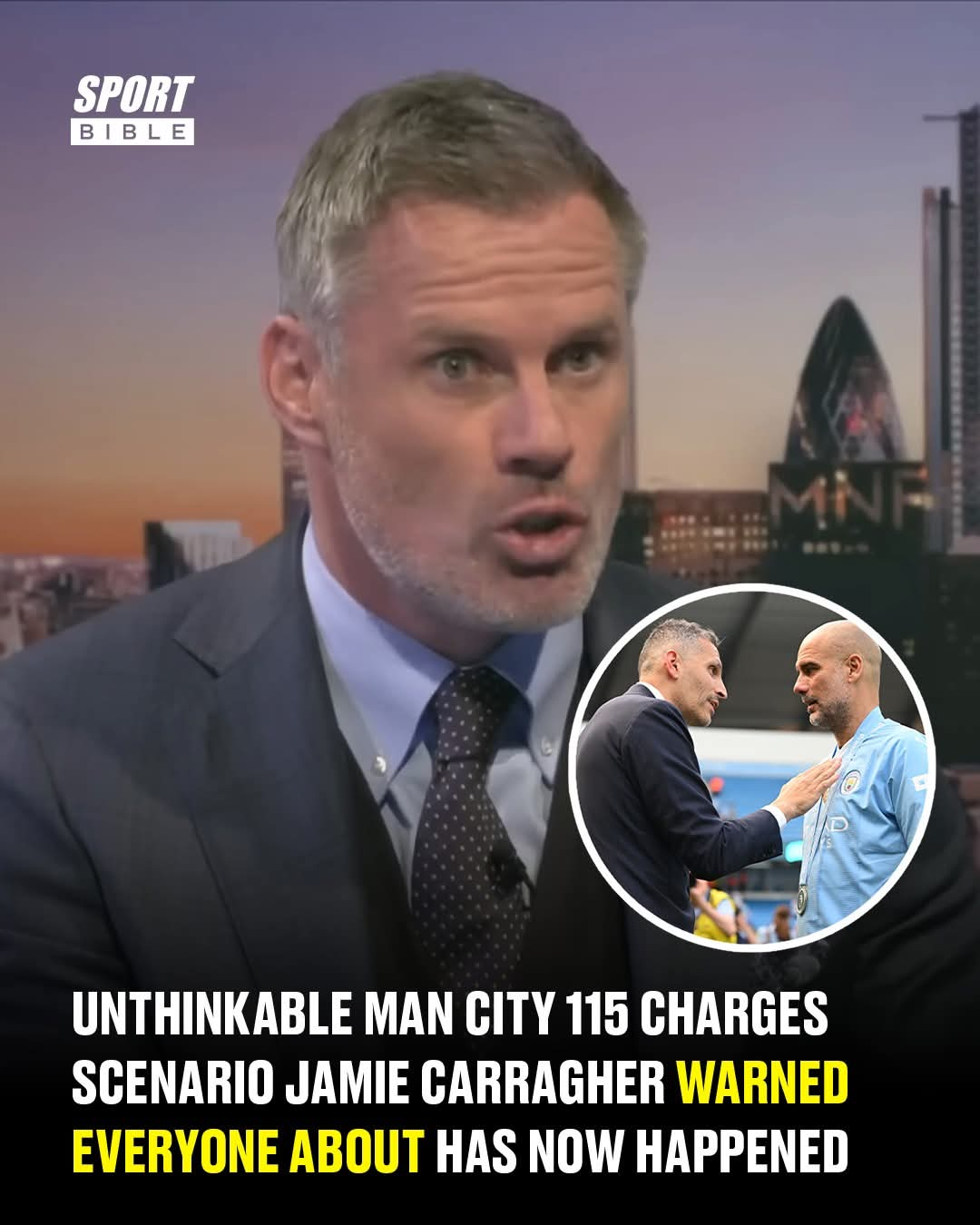The Manchester City 115 Charges: How Jamie Carragher’s Warning Became Reality

In the annals of football history, few legal proceedings have captured the imagination and concern of the sporting world quite like Manchester City’s ongoing battle with 115 charges brought against them by the Premier League. What began as a shocking announcement in February 2023 has evolved into a protracted legal saga that has cast a shadow over one of the most successful periods in English football history.
The case represents far more than a simple regulatory dispute. It strikes at the heart of modern football’s financial framework, touching on questions of competitive integrity, regulatory authority, and the very nature of sporting achievement in an era of unprecedented commercial investment. As the footballing world continues to await a verdict that could reshape the landscape of English football, the prescient warnings of former Liverpool defender Jamie Carragher have taken on an almost prophetic quality.
The story begins with Manchester City’s remarkable transformation from perennial underachievers to global powerhouses. Following Sheikh Mansour’s acquisition of the club in 2008, City embarked on an unprecedented spending spree that would eventually yield multiple Premier League titles, domestic cups, and their long-awaited Champions League triumph. However, this success came under increasing scrutiny from regulatory bodies concerned about the club’s compliance with Financial Fair Play (FFP) regulations.
The 115 charges announced by the Premier League in February 2023 represent one of the most comprehensive regulatory actions in football history. These charges span a period from 2009 to 2018 and cover a wide range of alleged violations, including:
Financial Reporting and Disclosure Violations: The most serious charges relate to allegations that Manchester City provided inaccurate financial information to the Premier League, potentially inflating revenue figures and understating costs to appear compliant with FFP regulations.
Additional charges concern the club’s alleged lack of cooperation with Premier League investigations, including failure to provide requested documentation and information.
UEFA-Related Charges: A smaller subset of charges relates to Manchester City’s dealings with UEFA, the European football governing body, which had previously investigated the club for similar alleged violations.
Manager and Player Remuneration: Some charges specifically address how the club reported payments to managers and players, suggesting potential discrepancies in disclosed compensation packages
To understand the significance of these charges, it’s essential to examine the regulatory environment that governs modern football. The Premier League’s Profit and Sustainability Rules (PSR), along with UEFA’s Financial Fair Play regulations, were implemented to prevent clubs from spending beyond their means and to maintain competitive balance within the sport.
These regulations emerged from concerns about the sustainability of football clubs following several high-profile financial collapses in the early 2000s. The rules aim to ensure that clubs operate within their means, generating sufficient revenue to cover their expenditures without relying solely on external investment that could disappear, leaving clubs in financial peril.
However, the implementation of these rules has been controversial from the outset. Critics argue that they entrench the advantages of historically successful clubs while preventing newer investors from challenging the established order. Supporters contend that they are essential for maintaining the long-term health of the sport and ensuring that sporting success reflects sound management rather than simply financial muscle.
From the moment the charges were announced, Manchester City has maintained a robust defense, categorically denying all allegations of wrongdoing. The club’s response has been characterized by several key elements:
Comprehensive Evidence Portfolio: City claims to possess what they describe as an “irrefutable body of evidence” that will vindicate their position. This suggests that the club believes it has documentation and testimony that will demonstrate compliance with all relevant regulations.
Legal Precedent: The club may be drawing confidence from their successful defense against UEFA charges at the Court of Arbitration for Sport (CAS) in 2020, where they overturned a two-year European competition ban, though primarily on technical grounds related to the statute of limitations.
Procedural Challenges: City’s legal team has likely explored various procedural challenges to the charges, potentially questioning the Premier League’s jurisdiction, the validity of evidence, and the appropriateness of the regulatory framework itself.
Reputational Management: Throughout the process, the club has continued to operate normally, making significant investments in players and infrastructure while maintaining that they are confident of vindication.
The decision to conduct the hearing in private reflects the sensitive nature of the evidence and the potential commercial implications of the proceedings. The December hearing represented a significant milestone in the process, bringing together legal representatives, expert witnesses, and the independent panel tasked with evaluating the evidence.
The private nature of these proceedings has created a information vacuum that has been filled with speculation and rumors. Unlike public court proceedings, where media coverage can provide regular updates on the progress of cases, the football world has been left to rely on occasional leaked reports and educated speculation from legal experts.
This secrecy has contributed to the sense of uncertainty that Jamie Carragher warned about, creating an atmosphere where Manchester City’s achievements are viewed through the lens of these pending charges, regardless of their ultimate merit.
In May 2023, just months after the charges were announced, Jamie Carragher articulated what many in football were thinking but few were willing to say publicly. Speaking on Sky Sports, the former Liverpool defender and current pundit delivered a warning that has proven remarkably prescient.
Carragher’s central argument was that the prolonged nature of the proceedings was damaging to all parties involved. He emphasized that Manchester City, regardless of their guilt or innocence, was suffering reputational damage simply by having these charges hanging over them. More importantly, he argued that the entire sport was being damaged by the uncertainty.
“Manchester City, rightly so, they defend themselves and say they’re innocent of all charges,” Carragher observed. “But if you’re innocent of all charges, why do people keep saying that we’re going to kick the can down the road? That this is going to go on for two to four years?”
This question struck at the heart of the matter. If City were truly innocent and possessed compelling evidence of their innocence, why would the process take so long? Conversely, if the charges had merit, why was the resolution taking so long that it risked undermining the credibility of the regulatory system itself?
Carragher’s warning about the “asterisk” that would hang over City’s achievements until the matter was resolved has proven particularly accurate. The club’s subsequent successes, including their historic treble in 2023, have been consistently viewed through the prism of these pending charges.
As we reach the two-and-a-half-year mark since the charges were announced, Carragher’s timeline concerns have been validated. The Telegraph’s reporting in April 2025 that a resolution might not come until the following season represents exactly the kind of prolonged uncertainty that Carragher warned against.
Competitive Integrity Questions: Every match City plays, every title they win, and every record they break is now subject to the caveat of these pending charges. This has affected how their achievements are perceived by fans, media, and fellow professionals.
Regulatory Credibility: The Premier League’s ability to effectively govern its member clubs has been called into question. If the league’s most serious charges cannot be resolved in a reasonable timeframe, what does this say about the effectiveness of the regulatory system?
Player and Staff Uncertainty: City’s players, coaching staff, and employees have had to work under the cloud of uncertainty about their club’s future. This has potential implications for recruitment, retention, and performance.
Fan Experience: City supporters have had to endure constant speculation about their club’s future, while supporters of rival clubs have had to watch City’s success while questioning its legitimacy.
The Manchester City case has implications that extend far beyond one club’s regulatory compliance. The outcome will likely influence how financial regulations are implemented and enforced across English football and potentially throughout European football.
Precedent Setting: Whatever the outcome, this case will establish important precedents for how financial regulations are interpreted and enforced. A guilty verdict would demonstrate the Premier League’s commitment to enforcing its rules, while an acquittal might be seen as validating more aggressive financial strategies.
Regulatory Evolution: The case has already prompted discussions about whether current financial regulations are fit for purpose in an era of sovereign wealth fund ownership and global commercial opportunities.
Competitiv Balanc: The outcome could significantly impact competitive balance in English football. Severe sanctions against City could open up opportunities for other clubs, while vindication might encourage more aggressive spending by clubs confident they can navigate regulatory challenges.
Even when the initial verdict is announced, the story is unlikely to end there. Both the Premier League and Manchester City have the right to appeal any decision they find unsatisfactory. This means that even a decisive initial verdict could be followed by months or years of additional legal proceedings.
The appeal process adds another layer of uncertainty to an already complex situation. It means that even when the football world finally receives the long-awaited verdict, there may be no immediate resolution to the questions that have dominated discussion of the ca
However, the profile of Manchester City and the significance of the charges make this case unique in many ways. The club’s success during the period covered by the charges, combined with their continued dominance while the case has been pending, has created a situation unlike any other in sports regulation.
Beind the legal arguments and regulatory frameworks are real people whose lives and careers have been affected by the prolonged uncertainty. City’s players have had to perform under constant scrutiny, with their achievements questioned before they’ve even been achieved. The club’s staff have had to work while uncertain about their employer’s future.
Even rival clubs and their supporters have been affected, forced to compete against and watch a team whose very legitimacy is in question. This has created an atmosphere of suspicion and uncertainty that has permeated English football.
Regardless of the ultimate outcome of the Manchester City case, it has already provided valuable lessons for football governance. The prolonged timeline has demonstrated the challenges of investigating complex financial arrangements while maintaining competitive integrity.
Future regulatory actions will likely need to balance thoroughness with timeliness, ensuring that investigations are comprehensive while not allowing uncertainty to undermine the sport’s credibility. The case has also highlighted the need for clear, consistent, and enforceable financial regulations that can adapt to the evolving commercial landscape of modern football
As Manchester City’s case continues to wind through the regulatory process, Jamie Carragher’s May 2023 warning has been thoroughly validated. The prolonged proceedings have indeed created the “asterisk” he warned about, hanging over not just City’s achievements but the entire English football landscape.
The scenario Carragher warned against has now fully materialized. What began as a shocking announcement has evolved into a prolonged saga that has damaged the reputation of all involved parties. City, regardless of their ultimate guilt or innocence, has had to operate under a cloud of suspicion. The Premier League has faced questions about the effectiveness of its regulatory processes. And English football as a whole has had to grapple with fundamental questions about competitive integrity and financial regulation.
The ltimate resolution of the case, whenever it comes, will be just the beginning of a longer process of rebuilding trust and credibility in English football’s governance structures. The lessons learned from this prolonged saga will hopefully inform future regulatory actions, ensuring that the sport can maintain its integrity while avoiding the damaging uncertainty that has characterized this case.
M
As the football world continues to wait for a verdict, Carragher’s warning serves as a reminder of the importance of swift and decisive action in regulatory matters. The cost of prolonged uncertainty, as this case has demonstrated, extends far beyond the parties directly involved and can undermine the very foundations of sporting competition.
The Manchester City 115 charges case will likely be studied for years to come as an example of how regulatory proceedings can shape not just individual clubs, but entire sporting ecosystems. Whatever the ultimate outcome, the case has already left an indelible mark on English football, validating the concerns raised by observers like Jamie Carragher who recognized early on that justice delayed would indeed be justice denied for all involved parties.















